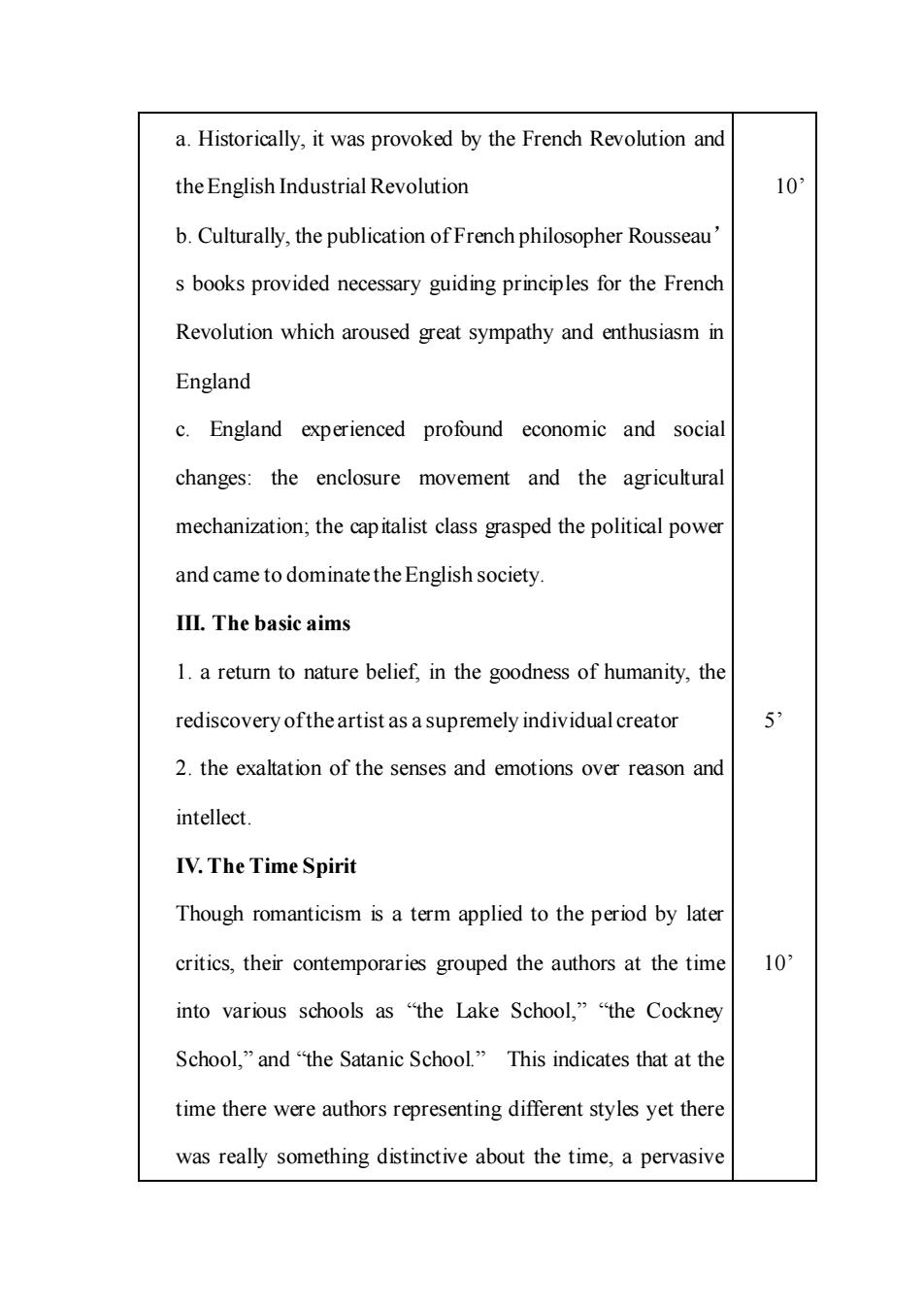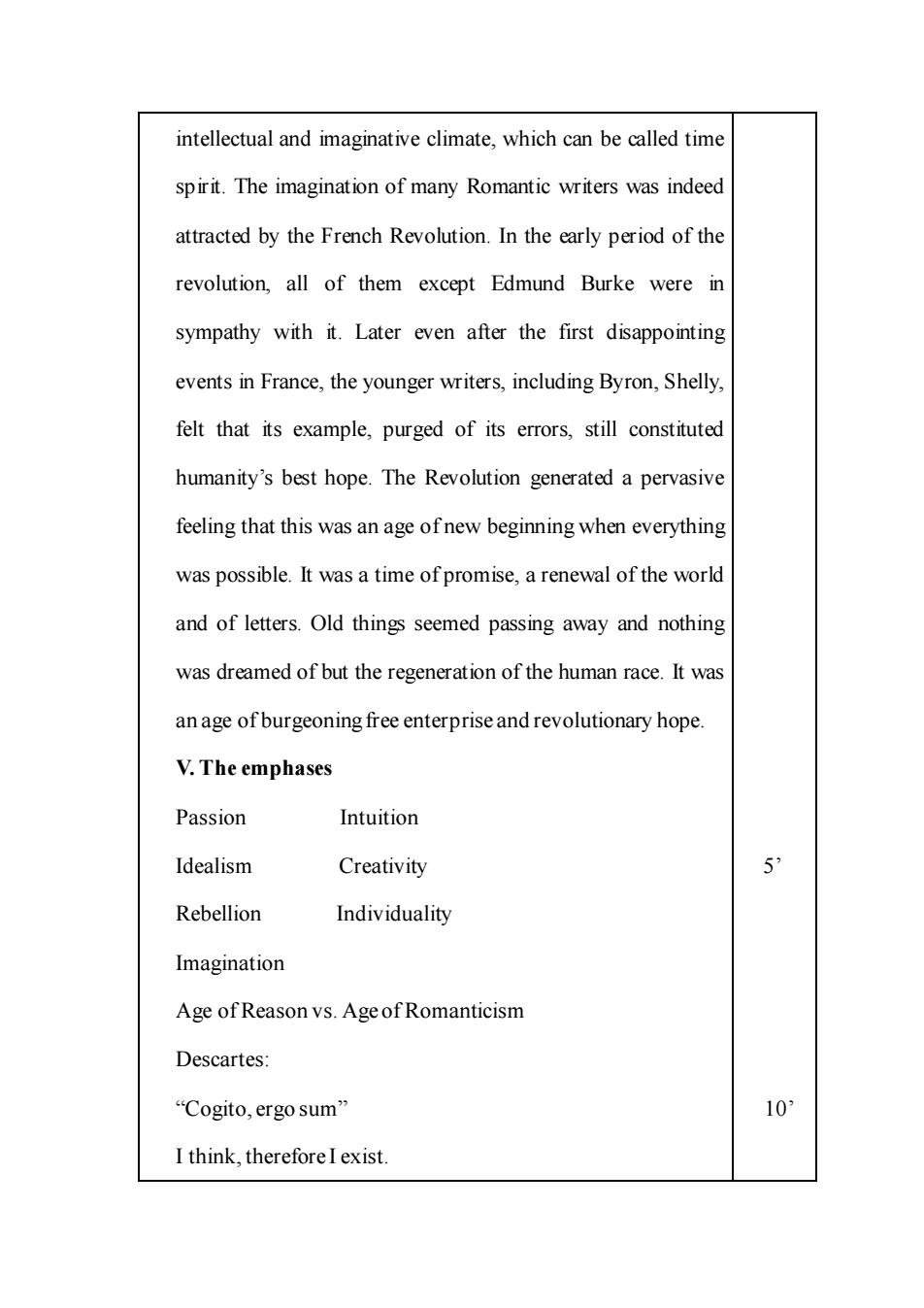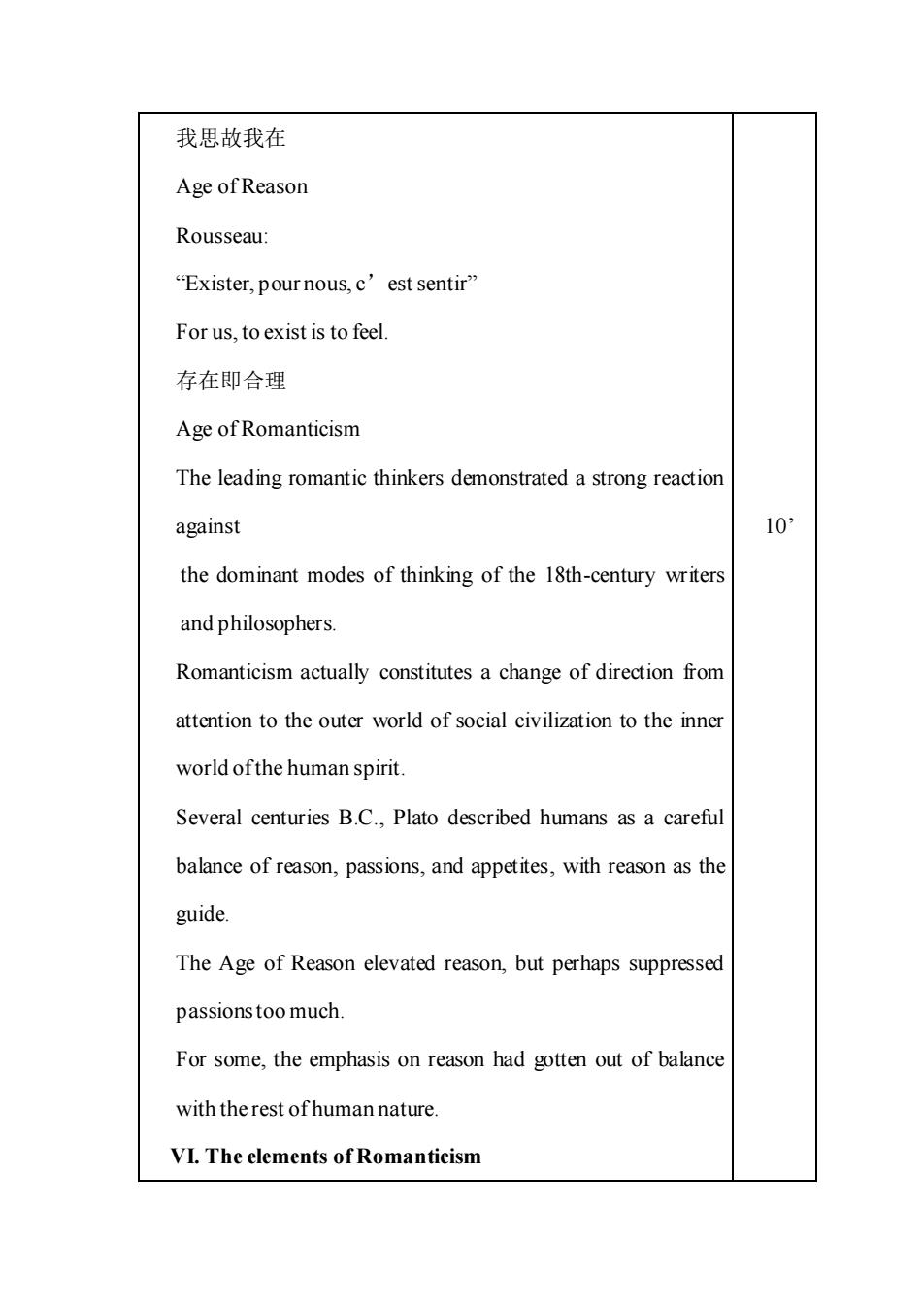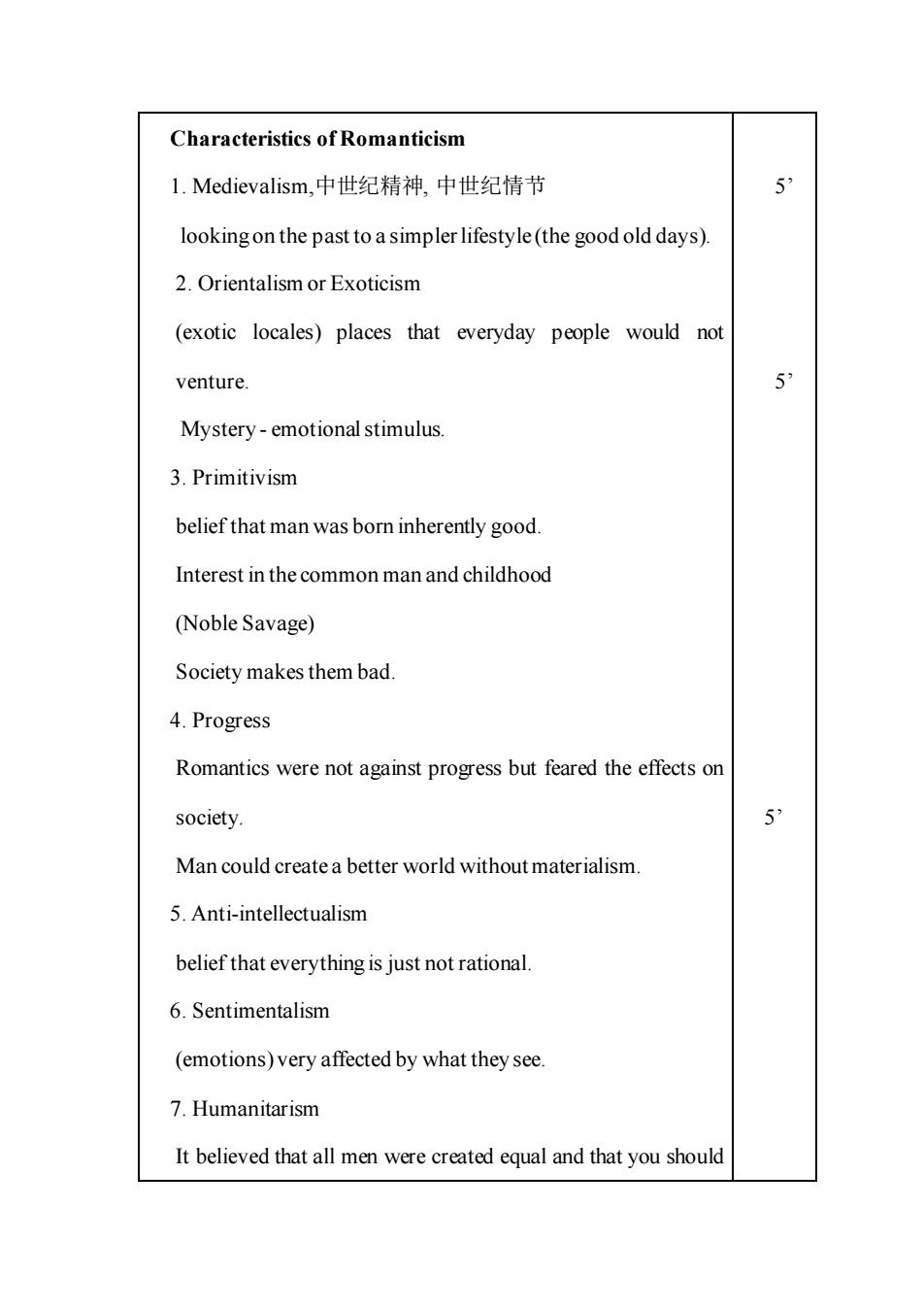
教案 课程名称 英国文学 授课专业和班级 英语本科 Lecture one 授课内容 Introductionto the Romantic 授课学时 Period To let the students see the significance of literature; 教学目的 To let the students have the general impression of British literature. students get basic knowedge of To get to know the general clue of British literary history 教学重点与To get to know the important British writers and literary works 难点 To get toknow somekey terms 教学方法 co m 辅助手段 Projector audio-video machine Romanticism in England I.The definition a complex artistic,literary,and intellectual movement originated in the second half of the 18th century in Western 5 Europe gained strength during the Industrial Revolution.It is a philosophical revolt against rationalism and a literary revolt against classicism II.The background
教 案 课程名称 英国文学 授课专业和班级 英语本科 授课内容 Lecture one Introduction to the Romantic Period 授课学时 2 教学目的 To let the students see the significance of literature; To let the students have the general impression of British literature. To let the students get basic knowledge of British literature 教学重点与 难点 To get to know the general clue of British literary history To get to know the important British writers and literary works To get to know some key terms To know some methods for literary appreciation and criticism 教学方法 Open questions and answers in class Class discussion and analysis 辅助手段 Projector, audio-video machine Romanticism in England I. The definition a complex artistic, literary, and intellectual movement originated in the second half of the 18th century in Western Europe gained strength during the Industrial Revolution. It is a philosophical revolt against rationalism and a literary revolt against classicism II. The background 5’

a.Historically,it was provoked by the French Revolution and the English Industrial Revolution 10 b.Culturally,the publication of French philosopher Rousseau s books provided necessary guiding principles for the French Revolution which aroused great sympathy and enthusiasm in England c.England experienced profound economic and social changes:the enclosure movement and the agricultural mechanization;the capitalist class grasped the political powe and came to dominate the English society. III.The basic aims 1.a return to nature belief,in the goodness of humanity,the rediscovery ofthe artist as a supremely individual creator 5 2.the exaltation of the senses and emotions over reason and intellect. IV.The Time Spirit Though romanticism is a term applied to the period by later critics,their contemporaries grouped the authors at the time 10 into various schools as "the Lake School,""the Cockney School,"and "the Satanic School."This indicates that at the time there were authors representing different styles yet there was really something distinctive about the time,a pervasive
a. Historically, it was provoked by the French Revolution and the English Industrial Revolution b. Culturally, the publication of French philosopher Rousseau’ s books provided necessary guiding principles for the French Revolution which aroused great sympathy and enthusiasm in England c. England experienced profound economic and social changes: the enclosure movement and the agricultural mechanization; the capitalist class grasped the political power and came to dominate the English society. III. The basic aims 1. a return to nature belief, in the goodness of humanity, the rediscovery of the artist as a supremely individual creator 2. the exaltation of the senses and emotions over reason and intellect. IV. The Time Spirit Though romanticism is a term applied to the period by later critics, their contemporaries grouped the authors at the time into various schools as “the Lake School,” “the Cockney School,” and “the Satanic School.” This indicates that at the time there were authors representing different styles yet there was really something distinctive about the time, a pervasive 10’ 5’ 10’

intellectual and imaginative climate,which can be called time spirit.The imagination of many Romantic writers was indeed attracted by the French Revolution.In the early period of the revolution,all of them except Edmund Burke were in sympathy with it.Later even after the first disappointing events in France,the younger writers,including Byron,Shelly felt that its example,purged of its errors,still constituted humanity's best hope.The Revolution generated a pervasive feeling that this was an age ofnew beginning when everything was possible.It was a time of promise,a renewal of the world and of letters.Old things seemed passing away and nothing was dreamed of but the regeneration of the human race.It was an age of burgeoning free enterprise and revolutionary hope. V.The emphases Passion Intuition Idealism Creativity 5 Rebellion Individuality Imagination Age of Reason vs.Age of Romanticism Descartes: “Cogito,.ergo sum” 10 I think.thereforeI exist
intellectual and imaginative climate, which can be called time spirit. The imagination of many Romantic writers was indeed attracted by the French Revolution. In the early period of the revolution, all of them except Edmund Burke were in sympathy with it. Later even after the first disappointing events in France, the younger writers, including Byron, Shelly, felt that its example, purged of its errors, still constituted humanity’s best hope. The Revolution generated a pervasive feeling that this was an age of new beginning when everything was possible. It was a time of promise, a renewal of the world and of letters. Old things seemed passing away and nothing was dreamed of but the regeneration of the human race. It was an age of burgeoning free enterprise and revolutionary hope. V. The emphases Passion Intuition Idealism Creativity Rebellion Individuality Imagination Age of Reason vs. Age of Romanticism Descartes: “Cogito, ergo sum” I think, therefore I exist. 5’ 10’

我思故我在 Age of Reason Rousseau: "Exister,pournous,c'est sentir" For us,to exist is to feel. 存在即合理 Age of Romanticism The leading romantic thinkers demonstrated a strong reaction against 10 the dominant modes of thinking of the 18th-century writers and philosophers. Romanticism actually constitutes a change of direction from attention to the outer world of social civilization to the inner world ofthe human spirit. Several centuries B.C.,Plato described humans as a careful balance of reason,passions,and appetites,with reason as the guide. The Age of Reason elevated reason,but perhaps suppressed passions too much For some,the emphasis on reason had gotten out of balance with the rest ofhuman nature. VI.The elements of Romanticism
我思故我在 Age of Reason Rousseau: “Exister, pour nous, c’est sentir” For us, to exist is to feel. 存在即合理 Age of Romanticism The leading romantic thinkers demonstrated a strong reaction against the dominant modes of thinking of the 18th-century writers and philosophers. Romanticism actually constitutes a change of direction from attention to the outer world of social civilization to the inner world of the human spirit. Several centuries B.C., Plato described humans as a careful balance of reason, passions, and appetites, with reason as the guide. The Age of Reason elevated reason, but perhaps suppressed passions too much. For some, the emphasis on reason had gotten out of balance with the rest of human nature. VI. The elements of Romanticism 10’

Characteristics of Romanticism L.Medievalism,中世纪精神,中世纪情节 5 lookingon the past to asimpler lifestyle(the good old days) 2.Orientalism or Exoticism (exotic locales)places that everyday people would not venture. Mystery-emotional stimulus 3.Primitivism belief that man was born inherently good. Interest in the common man and childhood (Noble Savage) Society makes them bad. 4.Progress Romantics were not against progress but feared the effects on society. 5 Man could create a better world without materialism. 5.Anti-intellectualism belief that everything is just not rational. 6.Sentimentalism (emotions)very affected by what they see 7.Humanitarism It believed that all men were created equal and that you should
Characteristics of Romanticism 1. Medievalism,中世纪精神, 中世纪情节 looking on the past to a simpler lifestyle (the good old days). 2. Orientalism or Exoticism (exotic locales) places that everyday people would not venture. Mystery - emotional stimulus. 3. Primitivism belief that man was born inherently good. Interest in the common man and childhood (Noble Savage) Society makes them bad. 4. Progress Romantics were not against progress but feared the effects on society. Man could create a better world without materialism. 5. Anti-intellectualism belief that everything is just not rational. 6. Sentimentalism (emotions) very affected by what they see. 7. Humanitarism It believed that all men were created equal and that you should 5’ 5’ 5’